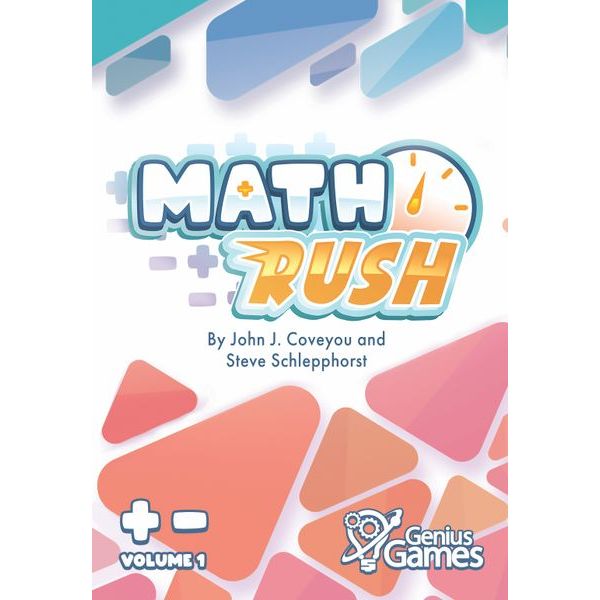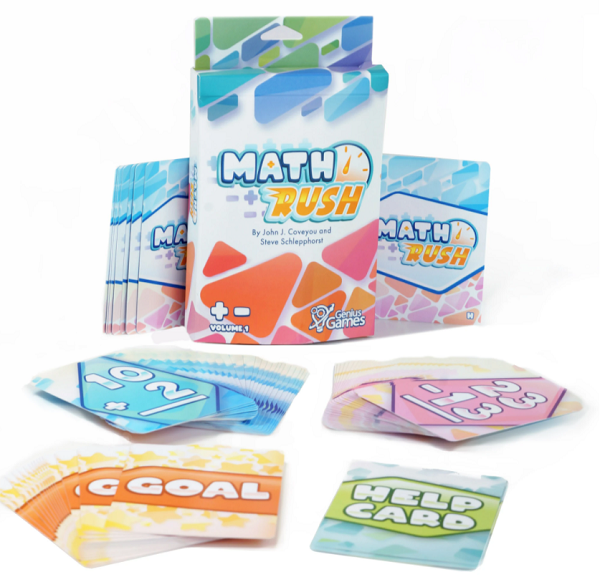Can You Math Under Pressure In Cooperative Card Game Math Rush?

One plus eight is easy. But when a timer is ticking, and the next number played has to be higher than the previous, and you can only play odds, it gets a lot more complicated to keep those calculations going in your head.
Published by Genius Games, Math Rush blends real time mechanics with cooperative card play and simultaneous turns in a game that can make even the simplest math tough.
Gameplay
You shuffle the goal cards and draw three, laying them out in a column. Each goal card lists how many cards must be played to it to complete it, how many points it is worth when completed, the direction the numbers have to go (ascending or descending order), and any special rules — for instance, only odd numbers can be played to it or only subtraction cards.
All the number cards are shuffled and a hand is dealt to each player (the hand limit varies from two to five based on player count). Each number card shows either a subtraction or an addition problem. Players have to mentally calculate the math problem in order to tell which number a card represents.
Once everyone has looked at their hands and the goal cards, a three-minute timer is started. Players work together to try to complete the goal cards. There are no turns and players can discuss strategy and their cards however much they wish. You may always draw back up to your hand limit after playing a card.
In order to complete a goal card, you must follow all the rules listed on it and play the required number of cards in a row next to it from left to right, being sure to play in ascending or descending order as required. While you cannot play a new card into a row between two already placed cards, if you have a card that is the same number as a card previously played into the row, you may place it on top of it. Stacked cards like this will count towards the required number for the goal card.
Once a card is played it cannot be picked back up, even if a mistake is made. However, players have three help cards between themselves. At any time you can choose to spend a help card to either discard as many cards from the table as you choose or to allow all players to discard as many cards from their hands as they wish and redraw back up to their hand limit.
When a goal card has been completed, you flip it face-down and then draw a new goal card and place it at the bottom of the column.
Once the timer ends, the round is over. You double check that all number cards for completed goals were correctly played (there are letters on the backside of each card to simplify this process) and you score the points listed on each completed goal.
Players then reshuffle all the cards and a new round begins. After three rounds, you add up all your points across each round, as well as scoring bonus points for any unused help cards.

Review
Math Rush has some of the feel of The Game series, with a ticking clock to increase the suspense. Simple math problems become a lot trickier when you only have a minute left, and you’re trying to check with other players what cards are in their hands.
It’s quite a suspenseful, fast-paced little game, with all the chaos and silly mistakes that often come with real-time gameplay. There’s some push-your-luck elements as you try to decide how big of a jump to make between numbers in a row, while the ability to stack cards gives you a little wiggle room, as do the help cards. It is also a game that you’re going to have the pleasure of slowly getting better and better at, which is satisfying for a team game where you simply check your score at the end to see how well you did.
The cards are a nice quality, and they’re easy to read. However, no timer is included in the game and, as with any game where one is required for play, we’d prefer to have one included with the components — especially as this is a game clearly targeted at families that kids could easily play alone.
Genius Games publishes games that have an educational bent to them, while not skimping on solid mechanics and game design. Math Rush is clearly trying to be an educational card game. Math isn’t going to be everyone’s cup of tea, but we legitimately had fun with the real-time cooperative math-ing. It does feel like a theme of some kind might have made it more accessible to a wider audience, but if you enjoy trying to math under pressure, this is a clever little game that’s fun to improve at and works well with a team.
Pros: Feels satisfying to increase your score over several games, cards are a nice quality, fun real-time mechanics, not many games feature math
Cons: Lack of theme makes it feel a little too educational which might turn some players off it, not everyone wants to do math while gaming
Disclosure: we received a complimentary review copy of this game.








Most gaming involves a pretty heavy amount of math; the key has always been to avoid making players feel they are doing homework. Decision trees, geometry, probability, and the ubiquitous "victory point arithmetic" are all over the place in gaming. Possibly due to common misconceptions about mathematics stemming from education systems, many only perceive the presence of mathematics when tedious arithmetic is involved.
Further, I am sorely disappointed at how reductionist this offering by Genius Games is. So many of their other games put significant effort into trying to bring interest and education into a proper game while this not only seems to fail to do the same fairness by mathematics for the reasons mentioned in the write-up, but also for one critical reason: the field of mathematics is not about obnoxious mental arithmetic "party tricks". Nobody gets a PhD in mathematics because they yearn to do long division in their heads while someone holds a stopwatch. I have no idea why so many people think that is the appeal of mathematics as a pursuit or career.
If you want a better idea of a game of mathematics that draws out the joy of mathematics without hiding behind a theme (e.g.: ALL polyomino games are mathematics games), I would recommend finding the hidden gem Reidemeister. It still feels a little too "educational" to be anyone's new favorite, but it puts a fun twist on a very real mathematical area of study.
I forgot to mention the game Set. It can be tough on those with color perception issues, but it is a fun game with a true-to-the-science treatment of Set Theory and basic logic.
Great points! Math is an important aspect of game design — though it is usually hidden in the strategic and tactical choices available to the players. If you invite your friends to the table to "play a math game" the invitation is likely to fail. This particular game might be a turn-off to some for this reason.